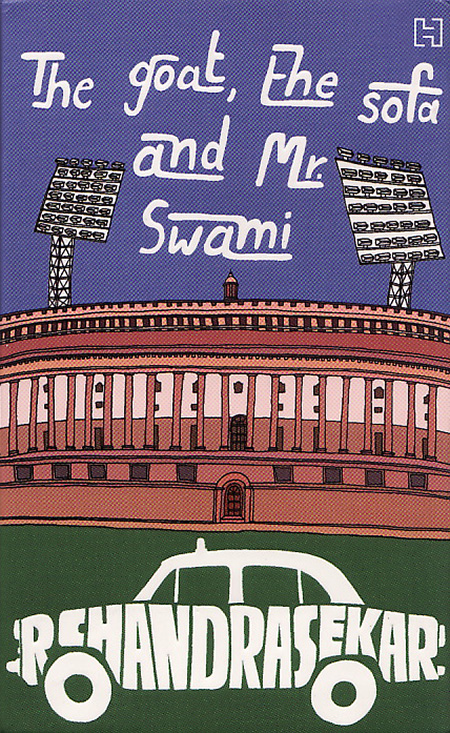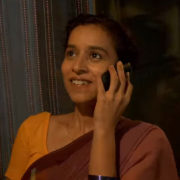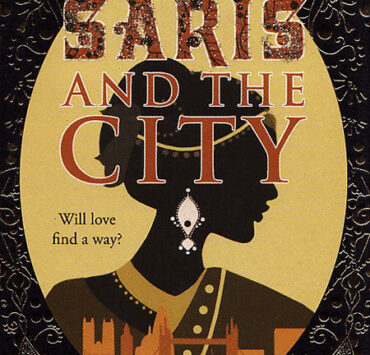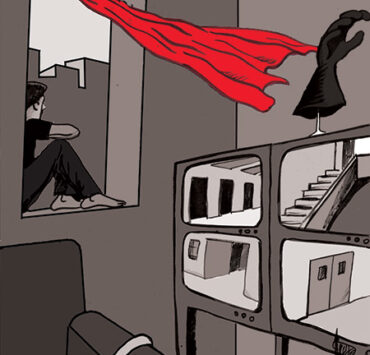Okay, so I have a Wodehouse hangover. Okay, so I don’t think anyone can replicate his brand of humour successfully enough to pass my hawk eye. Okay. So? That does not mean I can’t be pleasantly surprised once in a while, does it?
The Goat, the Sofa and Mr. Swami is your quintessential Jeeves and Wooster story, deliciously told—in a modified Indian setting, of course—with clever jibes and digs, often with no attempt at even trying to mask the intent on the part of the author. And once you learn to ignore the occasional attempts at being too clever, this book is a sheer treat for a lazy Sunday afternoon.

The Goat, the Sofa, and Mr. Swami book cover.
The plot is complex and convoluted, with a million subplots and characters and conspiracy theories. The Wooster here is the old, fat, lustful, and cunning Prime Minister of India, Mr. Motwani (*cough*Vajpayee*cough*). His personal assistant, Mr. Swami, I.A.S., is the Jeeves who lets the Prime Minister get into his own messes and, benevolently and calmly, proceeds to extricate him from the same, all the while working towards some personal advancement or the other. The tables are turned once in a while, when Mr. Swami is caught in positions that only the resourcefulness of the Prime Minister can save him from, but on the whole, the entire plot follows this Insert-X-in-Soup-let-Y-Save-the-Day pattern. The Prime Minister of Pakistan, Mr. Shah, has invited himself to an India-Pakistan cricket match series and the entire Indian administration must deal with this whole operation, fraught with suspicion and antagonism and media misinterpretations and the vested interests of all involved. Where do the goat and the sofa come in? Ah, but to tell you that would be a spoiler. The U.S.P. of the book lies not the story, but in putting up a comic and intricately etched portrait of the hypocrisy and self-service that is the administration of the Republic of India.
What occasionally mars the charm of the book is an attempt to be too clever and risqué on the part of the author. The opening chapter talks about the old Prime Minister enjoying a digitally-modified naked actress dancing to a popular Bollywood number on his V.C.R. and, um, pleasuring himself. Do we really want to know that? Imagine if Wodehouse had talked about Bertie’s sex life—this is just as out-of-place and sort of makes you draw back in distaste. Then there are these convoluted sentences with failed attempts at sarcasm which could have been done away with. If someone had been there to tell the author gently that “it’s a fine piece, stop now, don’t ruin it”, the book might have been better off.
Ultimately, however, these minor glitches aside, the book is an engaging, hilarious and unputdownable read. Original? Perhaps not in content, perhaps not in style per se, but combine the two, and you get a unique blend of humour and insight. You laugh at the gags, you laugh at 15 states rioting because the cuisine of two other states have been chosen to cater to the Pakistani Prime Minister, you laugh at the Kaveri water dispute coming up when the dance of one state is chosen over the other for the cultural show, you laugh at every other ridiculous situation the Indian bureaucracy throws up—and yet, a worry and a sense of gloom eats away at the back of your mind, like a nagging headache that you just can’t wish away.
You laugh and wonder how long you will laugh at the same things, how long you can sit back and take all this and just have a few laughs as your consolation prize. You wonder how long you can laugh away the corruption that pervades every level of the administration; you wonder how long you can make cynical and clever remarks on the partisan nature of the states in the Republic; you wonder how long you can overlook the very basic lack of a national feeling that is eating away at the core of our country. If a book can give you stitches in the stomach and plant a deep sense of discomfort in your mind, I think it is an epic success.
[Hachette India; ISBN 978-93-5009-061-9]








More Yes Minister than Wodehouse, I thought?
Just a matter of perspective I suppose :)
Sounds like Yes Minister..